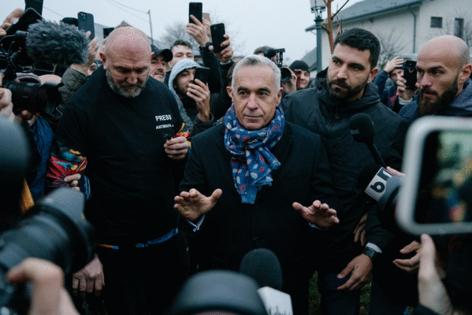Commentary: Romania is fighting back against Russia's election interference
Published in Op Eds
Romania’s presidential election last month shocked the country and its government when Calin Georgescu, an obscure far-right candidate, secured the most votes in the first round.
Romania, an Eastern European country bordering Ukraine, has been a strong member of NATO for two decades and a member of the European Union for nearly as long. The far right has been surging across much of Europe, pushing an agenda that is anti-EU, pro-Russia and against support for Ukraine. But its success in Romania was unexpected.
Georgescu’s win seemed to come out of nowhere. With no major party backing or meaningful public profile only a few weeks before the election, he went from an unknown to the top candidate almost overnight. He even bragged about having no campaign budget. How did this happen?
Surprise, it was Russia.
Under Romania’s multiparty system, if no presidential candidate secures an absolute majority in the first round, the top two candidates go to a runoff. Thirteen candidates competed in this race, and Georgescu was polling at about 1% at the start of November.
In the last two weeks of the campaign, Georgescu was suddenly all over TikTok. He gained hundreds of thousands of followers and millions of likes in that time. That was apparently enough to secure 24% of the vote, the most of any candidate.
According to Romania’s security services, an aggressive Russian influence campaign did the trick, boosting his online presence by manipulating TikTok’s algorithms using thousands of coordinated fake accounts and extensive paid promotion.
It looked like the Constitutional Court was going to let the first-round outcome stand. But Romania’s current president, Klaus Iohannis, declassified intelligence reports to demonstrate publicly the extent of Russia’s interference. On Dec. 6, the court made its final decision to annul the results, citing the illegal use of technologies, including artificial intelligence; undeclared funding sources; and preferential treatment on social media that “resulted in the distortion of voters’ expressed will,” The Associated Press reported.
The Russian government has long been active in election interference and related disinformation campaigns against democracies. Its modus operandi is mostly to spread disinformation, stoke distrust in institutions and institutionalists, and boost far-right (and anti-Western) candidates and causes. No open and democratic society has figured out how to effectively obstruct or prevent Russian meddling, so Vladimir Putin’s government has repeatedly gotten away with it. For Putin, it’s a relatively low-cost foreign policy tool with few downsides.
Americans are likely most familiar with Russian meddling in the 2016 U.S. election, but Russian disinformation operations also marred the 2016 Brexit vote in the United Kingdom, targeted the 2017 German election and undermined the European Parliament elections across France, Germany and Poland earlier this year. The U.S. election this year wasn’t spared, either, with an onslaught of fake videos and interviews claiming election fraud where there was none.
Russia’s meddling isn’t limited to these countries, either. Russia’s Africa policy has long focused on thwarting democratic progress there, where its disinformation campaigns have been quite effective in boosting authoritarian actors across some two dozen countries.
For the most part, the Kremlin has needed its minions only to build on existing conspiracy theories, mistrust and polarization. This makes measuring the impact of such meddling quite difficult. Inquiries and investigations in the United States, United Kingdom and elsewhere have failed to show that Russian interference concretely changed election outcomes. After all, it’s an influence game on the margins. Did false posts claiming corruption in the process persuade enough people to stay home to change the outcome in a critical state? Or did fake accounts drive enough outrage in a key population to tilt the vote toward or away from one candidate? It’s hard to prove.
This makes it very hard to navigate what the appropriate response might be. Russia’s acts are illegal, typically violating election laws, campaign finance laws, and social media regulations and standards. Beyond sanctions (and Russia is already sanctioned to the hilt), what actions should targeted countries take? Is it enough to expose the dishonesty and interference? Will that prevent people from falling prey to it or changing their views or vote accordingly? Should a candidate illegally boosted by an outside power be disqualified? It’s not at all clear, after all, that Georgescu was aware of or involved with Russia’s plan.
Will redoing Romania’s election prevent the malign influence on the outcome next time? What if the vote ends up the same?
In Romania, the Russian campaign also drew on and exploited real grievances. Many Romanians have grown disillusioned with the two main political parties and were looking for other options. Tossing out election results when the vote itself wasn’t compromised is controversial, too.
Time will tell if a rerun solves the problem of undue Russian influence in Romania. But the bigger lessons here for all democracies that face disinformation campaigns are that it’s far better to prevent them than to expose them after the fact and that much more must be done to regulate and monitor social media. Romania has demonstrated that the impact of not addressing these issues effectively can be dire.
____
Elizabeth Shackelford is senior policy director at Dartmouth College’s Dickey Center for International Understanding and a foreign affairs columnist for the Chicago Tribune. She was previously a U.S. diplomat and is the author of “The Dissent Channel: American Diplomacy in a Dishonest Age.”
__
©2024 Chicago Tribune. Visit at chicagotribune.com. Distributed by Tribune Content Agency, LLC.




























































Comments